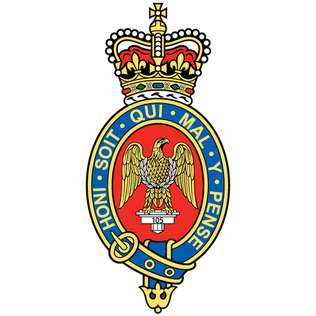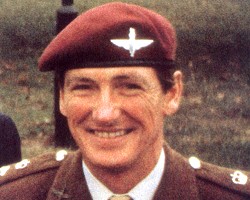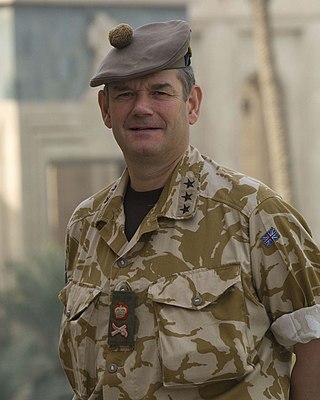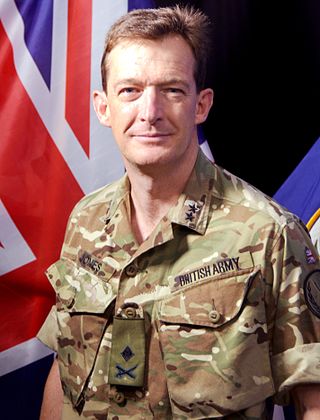
General Sir Michael David Jackson, is a retired British Army officer and one of its most high-profile generals since the Second World War. Originally commissioned into the Intelligence Corps in 1963, he transferred to the Parachute Regiment in 1970, with which he served two of his three tours of duty in Northern Ireland. On his first, he was present as an adjutant at the events of the Ballymurphy massacre (1971), where eleven unarmed civilians were shot dead by British troops, and then at Bloody Sunday in 1972, when British soldiers opened fire on unarmed protesters, killing fourteen. On his second, he was a company commander in the aftermath of the Warrenpoint ambush (1979), the British Army's heaviest single loss of life during the Troubles. He was assigned to a staff post at the Ministry of Defence (MoD) in 1982 before assuming command of the 1st Battalion, Parachute Regiment, in 1984. Jackson was posted to Northern Ireland for the third time, as a brigade commander, in the early 1990s.

The Distinguished Service Order (DSO) is a military decoration of the United Kingdom, as well as formerly of other parts of the Commonwealth, awarded for operational gallantry for highly successful command and leadership during active operations, typically in actual combat. Since 1993 it has been awarded specifically for "highly successful command and leadership during active operations", with all ranks being eligible. It is a level 2A decoration (order) in the British system of military decorations.

The Welsh Guards, part of the Guards Division, is one of the Foot Guards regiments of the British Army. It was founded in 1915 as a single-battalion regiment, during the First World War, by Royal Warrant of George V. Shortly after the regiment's formation, it was deployed to France where it took part in the fighting on the Western Front until the end of the war in November 1918. During the inter-war years, the regiment undertook garrison duties in the United Kingdom, except between 1929 and 1930 when it deployed to Egypt, and late 1939 when it deployed to Gibraltar.

The Military Cross (MC) is the third-level military decoration awarded to officers and other ranks of the British Armed Forces, and formerly awarded to officers of other Commonwealth countries.

The Battle of Goose Green was fought from 28 to 29 May 1982 by British and Argentine forces during the Falklands War. Located on East Falkland's central isthmus, the settlement of Goose Green was the site of a tactically vital airfield. Argentine forces were located in a well-defended position within striking distance of San Carlos Water, where the British task force had positioned themselves after their amphibious landing.
The Battle of Wireless Ridge was an engagement of the Falklands War which took place on the night from 13 to 14 June 1982, between British and Argentine forces during the advance towards the Argentine-occupied capital of the Falkland Islands, Port Stanley.

The Irish Guards (IG) is one of the Foot Guards regiments of the British Army and is part of the Guards Division. Together with the Royal Irish Regiment, it is one of the two Irish infantry regiments in the British Army. The regiment has participated in campaigns in the First World War, the Second World War, the Iraq War and the War in Afghanistan as well as numerous other operations throughout its history. The Irish Guards claim six Victoria Cross recipients, four from the First World War and two from the Second World War.
General Sir Roger Neil Wheeler, is a retired British Army officer who served as Chief of the General Staff from 1997 to 2000. During his career he was involved in the Cyprus Emergency, directed military operations in Northern Ireland and led the UK's forces deployed on NATO operations in Bosnia. He is now a non-executive director of several businesses operating on an international basis.

45 Commando Royal Marines is a battalion sized unit of the British Royal Marines and subordinate unit within 3 Commando Brigade Royal Marines, the principal Commando formation, under the Operational Command of the Fleet Commander.

The Blues and Royals (RHG/D) is a cavalry regiment of the British Army, part of the Household Cavalry. The Colonel of the Regiment is Anne, Princess Royal. It is the second-most senior regiment in the British Army.
This is a list of British ground forces in the Falklands War. For a list of ground forces from Argentina, see Argentine ground forces in the Falklands War

Lieutenant Colonel Herbert Jones,, known as H. Jones, was a British Army officer and posthumous recipient of the Victoria Cross (VC). He was awarded the VC after being killed in action during the Battle of Goose Green for his actions as commanding officer of the 2nd Battalion, Parachute Regiment, during the Falklands War.

Brigadier Lewis Pugh Evans, was a British Army officer and a recipient of the Victoria Cross, the highest award for gallantry in the face of the enemy that can be awarded to British and Commonwealth forces.
Christopher Patrick Benedict Keeble, DSO, MSc, FCMI is a former British Army officer, who fought in the Falklands War.

The Scots Guards (SG) is one of the five Foot Guards regiments of the British Army. Its origins are as the personal bodyguard of King Charles I of England and Scotland. Its lineage can be traced back to 1642 in the Kingdom of Scotland, although it was only placed on the English Establishment in 1686.

Lieutenant General John Cooper, is a former senior British Army officer. From March 2008 he was the Deputy Commander of Multinational Force-Iraq (MNF-I), the operational-level headquarters in Iraq, and the Senior British Military Representative-Iraq. As Deputy Commander, he was the principal assistant to General Raymond T. Odierno of the United States Army. He stepped down on 4 March 2009, and retired from the army later that year.

Lieutenant General Sir Hew William Royston Pike is a retired senior British Army officer known for his service in the Falklands War and for his command in Northern Ireland.

Lieutenant Colonel Rupert Stuart Michael Thorneloe, MBE was a British Army officer who was killed in action on 1 July 2009 near Lashkar Gah, Helmand Province in southern Afghanistan. Thorneloe is the highest-ranking British Army officer to have been killed in action since Lieutenant Colonel H. Jones's death in 1982 during the Falklands War.
Lieutenant General Sir Cedric Norman George Delves, is a retired British Army officer and a former commander of the 22nd Special Air Service Regiment.

Major General Rupert Timothy Herbert Jones is a retired senior British Army officer, who served as the Standing Joint Force Commander from November 2018 to July 2021.















